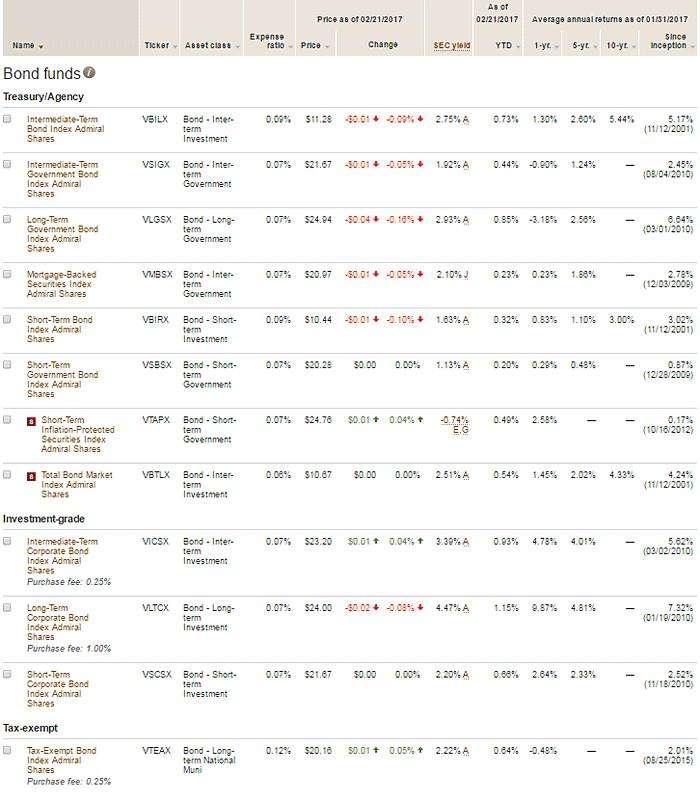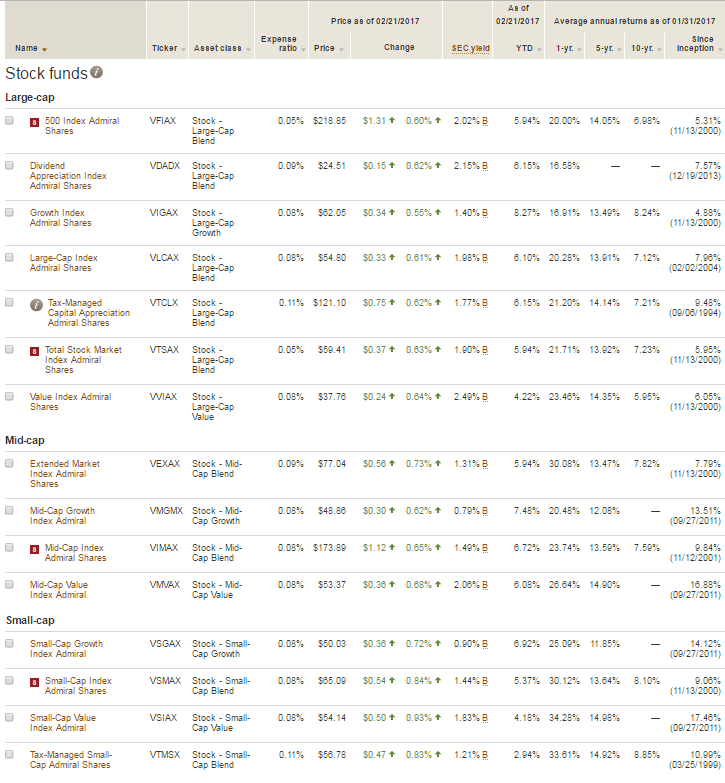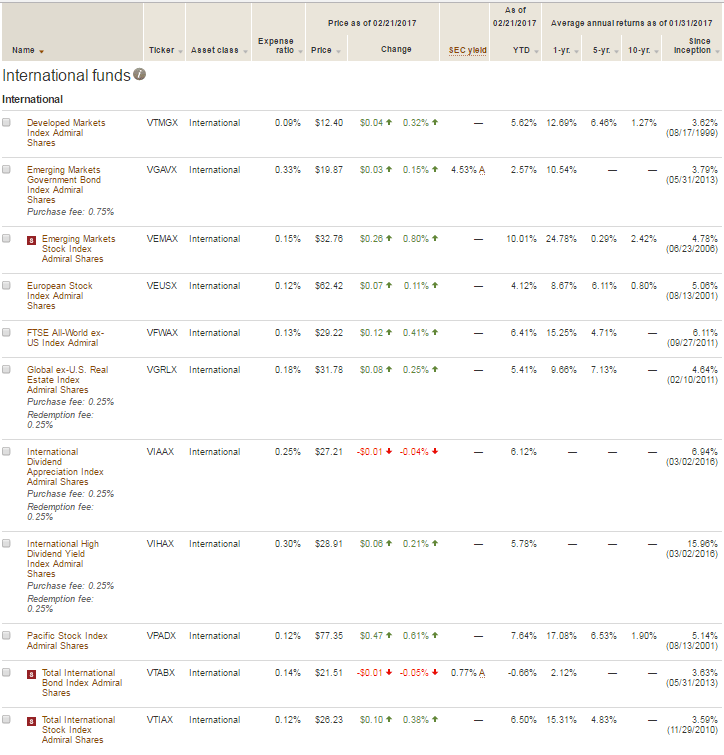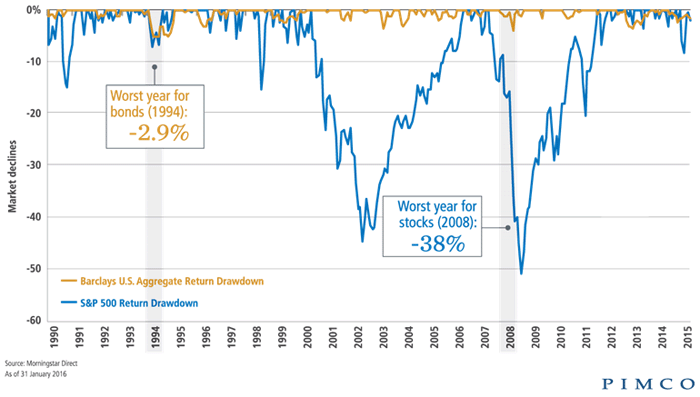
So you’ve finally listened to my endless posts about index fund investing. You’ve opened a Vanguard account and you’re ready to start socking away money and (hopefully) watching it soar. Almost there… you get to the “Choose Your Fund” page and…
127 matching funds?!?
And 55 more ETFs??
Don’t faint just yet.
I get it. You want to invest but you don’t want to blindly put your hard earned money into the wrong fund. With so many options, it can feel like throwing darts at a board.
Today’s blog post, here to help. It’s a bit of a lengthy one, I admit, but stick with it! Choosing the right type of fund is important stuff, and can mean the difference of several hundreds of thousands of future dollars.
So, we’ll take a look at the different asset classes available, then close with my unprofessional recommendations. (I’m just a guy spouting his opinion on a blog for free. Don’t sue me!)
Like all complicated life decisions, we can break index fund investing down into a few easy steps:
Step 1) ETF or Mutual Fund?
What do you know, I wrote whole post on the subject. Don’t worry, it’s a quick read and full of my usual hilarious jokes.
No?
In short, all else being equal, I believe most people would benefit from investing in Mutual Funds over ETFs.
Step 2) Understand the Table
With step 1 out of the way, it’s time for step 2. (How’s that for a segue??)
First, let’s get familiar with scoping out the funds:

You can take a look at the full table yourself here.
In all that chaos, I’ve highlighted three important numbers:
1) Expense Ratio: Expenses are KEY! Index funds are a lot like batteries… sold by a lot of different companies, and they’re all basically the same.
The one big, huge, noticeable difference between index funds? Fees. Vanguard has rock bottom expenses, which is why we’re here after all.
The expense ratio is the overall cost to run the fund. It’s calculated as a percentage of assets. So in the above example with 0.05% expense ratio, you would pay Vanguard $5 per year for each $10,000 you invested.
In the investing world, Vanguard’s rates are crazy unbelievably low, especially when compared to say, financial advisors who often charge fees 20 times as high. (And are usually just investing in index funds anyway)
2) SEC Yield: This is the yearly fixed income you can most likely expect to earn from a given fund.
For stock funds, this is the average dividend yield. For bond funds, this gets slightly more complicated, but in general, it represents the approximate fixed income distributions an investor can expect.
In our example, the S&P 500 Index Fund has an SEC Yield of 2.02%. This means that if I invested $10,000 into the fund, I can reasonably expect to earn about $202 in annual dividends. Cha ching!
3) Average Annual Returns: This is the historical total return of the fund, taking into account both fixed income payouts and the fund’s price appreciation.
While historical returns can give you a rough idea of what to expect, don’t get carried away and start banking on a 20% return just because you found some fund which performed that well over the past few years. Remember that investing is cyclical, and what goes up can (and often does!) come down.
Step 3) Sort by Asset Class
Asset class is just investor lingo for “what type of investments make up this fund.”
Step 4) Click “Filter” and Select a Fund minimum of $10,000.
This shows all of Vanguard’s “Admiral Shares” funds, which require a $10,000 minimum investment in exchange for some of the cheapest expense ratios anywhere.
Don’t have $10,000 to invest? Don’t worry, all of the Admiral Shares funds have corresponding “Investor Shares” funds which are exact copies, but only require a $3,000 minimum. Investor shares funds do have slightly higher expense ratios, but overall the fees for any Vanguard fund are still crazy, unbelievably low. (80-90% less than the industry average)
Why are we only looking at admiral shares funds? These are Vanguard’s flagship funds. If Vanguard doesn’t offer a fund as an Admiral Shares fund, chances are you’re looking at some sort of wonky investment option that a beginning investor has no business getting into anyway.
We’ll now be running through the basics of each asset class, before ending this post with some more specific recommendations.
This post is filled with a bunch of snapshots direct from the Vanguard website, but do keep in mind that all of these asset classes should be available at any other reputable broker.
Bond Funds
These funds invest in bonds or other forms of debt. At their core, bonds are just IOUs from businesses to investors. As interest on the debt is collected, investors in bond funds receive fixed income.
Bonds are less risky than stocks, and bond investors generally like the above mentioned fixed income potential. Normally, bond prices and stocks should move in opposite directions, making bonds an excellent tool for diversification.
Vanguard has a host of bond funds. Warning, and overwhelming number of options coming:

Looks pretty complicated, but we can tackle this by category.
Treasury/Agency Bond Funds:
These are your least risky bond funds.
Most of these invest in* US government bonds. Because US government bonds (aka treasury bonds) are backed by Uncle Sam himself, these funds present the least amount of risk (and therefore lower yields).
*You can click on any fund and read the “product summary” if you want specific details.
Investment Grade Bond Funds:
Investment grade bonds have a slightly higher risk of default than say, the U.S.A. who can always just print some more money if times get too hard, but these bonds are still among the safest investments out there.
Most investment grade bond funds invest in corporate bonds. Think bonds from your General Electrics, Hewlett-Packards, ATTs, and UPS..es.
Tax Exempt Bond Funds
By investing in municipal bonds, tax exempt bond funds can provide income exempt from federal income tax. A pretty sweet deal, although I typically ignore these funds since I (sadly) do not make enough money for the tax exemptions to really be worth my time.
Stock Funds
Again, a long list of options which we can break down by category:

Large Cap
“Large Cap” in stock market lingo means a company valued is over $10 billion. Large cap investors love the idea of putting their money to work with big, safe, mature companies.
This section includes many different mixes and options. Here are some funds and terms to familiarize yourself with:
- 500 Index Fund: The 500 stands for “S&P 500” which are the 500 largest companies in the United States. When people refer to The Stock Market doing this or doing that, they’re usually referring to the Dow (30 of the biggest companies in the U.S.) or the S&P 500 (the 500 largest companies in the US).
- Value Index Fund: Value investing refers to purchasing temporarily depressed or undervalued companies, and hoping those companies eventually climb back up in value. Bank of America during the financial crisis is an example of a value investment.
- Growth Index Fund: Growth investing is all about finding companies with above average potential for expansion. Imagine Apple after the hype of a new iPhone, or Tesla prior to a press release about world changing technology.
- Total Stock Market Index: The Grand Daddy of Diversification. This isn’t technically a large cap fund, since the fund invests in the entire market, big or small. You may recognize this name from my monthly Net Worth Updates.
Mid Cap
The name is full of spoilers here, because “Mid Cap” does indeed refer to middle sized companies. In the stock market world, this means a company valued between $2 to $10 billion.
Again, Vanguard offers a number of mid cap funds to choose from, including Mid-Cap Value, Mid-Cap Growth, and an overall Mid-Cap Index.
Small Cap
Small cap stocks are those companies valued between $300 million and $2 billion.
In theory, these companies’ small sizes offer the most growth potential, at the tradeoff of the most risk. With small caps, you could be looking at your next Chipotle or your next Qumu. (Yeah, I’ve never heard of Qumu either…)
International Funds
While the previous stock funds were indexes of the United States stock market, Vanguard hasn’t forgotten about our friends north of the border, south of the border, or across the pond.

International Funds can provide diversification in addition to what is available in a U.S. basket of stocks. In theory, a country halfway across the world could experience booming years while our own markets stagnate, although some recent research shows an increasing correlation between all countries as our world becomes more global. For example, the United States’ 2008 financial crises triggered stock market declines all around the world.
A few terms to familiarize yourself with:
- Developed Market Index: these invest in “developed” countries – mostly United Kingdom, Japan, France, Germany, Canada, etc. Here you are looking at more stability in exchange for less rapid return potential.
- Emerging Market Index: no surprise that these invest in “emerging” countries – China, India, Brazil, etc. These carry more risk and volatility, but also a chance for higher growth.
- Total International Index: as the name implies, this seeks to track the entire international stock market outside of the US. Vanguard does this by investing in both developed and emerging markets all over the globe.
Time to Get Diversifying
And there ya go! We’ve already covered enough index funds to keep even the most sophisticated investor properly diversified for a lifetime.
So, where to from here? How many funds should I have? What about asset allocation? Bond percentages? Fund correlation? Ahh!!
Stop. Take a moment. Breathe.
Here’s the good news: it’s very hard to go wrong with any of Vanguard’s Index funds.
An index fund, by nature, consists of thousands of parts, which means that even if some of the stocks or bonds within the fund tank, the rest are there to pick up the slack.
Want to keep it absolutely, unbelievable simple? Well, there’s a strong case to be made for throwing all your eggs into one basket: VTSAX (the Total Stock Market Index Fund we talked about earlier) and calling it a day.
With that, you’ll be invested in every publicly traded company in the US. And most of these companies also have significant business overseas. How’s that for diversification?
All-In on VTSAX is pretty close to my entire investment strategy summed up, and I’m not the only person who thinks this is a good idea. Lots of other investors much smarter than I do the same: Here’s one example. And another. And another…
Wanting a little more excitement, or exposure to another asset class? Consider adding a small position of the Total International Index, or even the Emerging International Index if you’re feeling extra frisky.
Can’t stomach the wild market swings, or are closer to retirement? Consider reducing volatility with a larger position in bonds, whose worst decline in the past 25 years was just 2.9%, compared to the stock market’s catastrophic decline of 38% in 2008. I like the Total Bond Market Index (VBMFX).

That should help smooth the ride for you.
When in doubt, keep it simple.
In a world of chaos, false salesmen, and wild speculation, an index fund strategy is one of the safest paths to riches.
The most successful investor in history agrees:
My advice to the trustee couldn’t be more simple: Put 10% of the cash in short-term government bonds and 90% in a very low-cost S&P 500 index fund. (I suggest Vanguard’s.)” –Warren Buffet, 2014 Letter to Shareholders
Related Articles:


Thanks for the guide! I haven’t gotten heavily into investing yet since we’re paying off debt right now, but I do need to think about our investment strategy. Ugh, everyone tosses around the term “index fund” like there’s only one, but of course there are so many to choose from. I do like that we have options though. 🙂
Exactly. A lot of investors get scared away by the number of index fund choices, and that’s a huge shame.
I hope this article will keep people from missing out.
We’ve been with Vanguard for 30 years, and strictly index funds for most of those. Nothing but good things to say about the company, low fees, and ease of managing our own accounts. With a little bit of reading and learning on my own, I have not paid $0.01 to a CFP and never will. This is a good article for those starting out, Vanguard is the best.
One of the original index funds investors! Awesome! Great to hear it’s working out for you.
Thanks for the tips! I had been stockpiling some money for the past few months and wanted to get into Index Funds on Vanguard, but I was initially overwhelmed with all the choices. My money sat in limbo for the past week, but now I can now proudly say I’m on the index fund wagon!
Welcome aboard! Glad to hear you’ve now got your money working for you.
Great explanations. Thank you for the simplification. Question, why does the SEC yield differ from the annual rate of return so much? I would think it would be the same. Yet there is a huge difference according to your explanation.
I am currently making decisions for a 401K plan.
The two differ because the SEC Yield is only one of two components adding to your annual return.
SEC Yield = fixed income returns, such as dividend payments. These occur no matter what stock prices are doing.
Annual Rate of Return = SEC Yield + any asset apprecation. Asset appreciation meaning changes to the price of a stock.
Let’s use a real estate analogy as an example. Imagine instead of a stock or index fund you have a rental house. If you buy a rental house for $100,000 and receive $10,000 in rental profits per year, your SEC Yield would be 10%. But if an appraisal came in at the end of the year and the home was now valued at $120,000, then you would also have $20,000 in appreciation. Your annual return would total $30,000, or 30%.
Now to add more questions on top of the many you receive. So let’s say your on pace to max out 401k and have after tax money to invest do you a) Roth IRA or b) index fund? Thanks for the help! Trying to decide before the April deadline ?
At the end of the day, tax advantages means more money in your pocket… eventually… so I personally max out the Roth before I start contributing to my after tax index funds.
Is there any way to invest if you are not from the US? This is really interesting, but I live in Spain and I’m not sure about what can I do from here.
Jav,
Admittedly this is not my area of expertise, so here’s a pretty helpful guest post from JL Collins on the subject.
http://jlcollinsnh.com/2014/01/27/stocks-part-xxi-investing-with-vanguard-for-europeans/
great fan of your newsletters, simple and easy to understand. Behind does simple words I can tell a well knowledgeable financial person. From early on I am a big Vanguard fan for all the reason you had given
Thanks!
Any thoughts on the best socially responsible funds?
Lorraine,
I don’t believe in socially responsible funds for one reason. How do we decide which companies are morally “good” and which are bad?
Take Vanguard’s socially responsible fund, VFTSX. Their #1 holding? Apple.
You know, Apple, the company that had to install nets around its sweatshops to keep employees from jumping from the top of said sweatshops to their deaths, because the working conditions are so miserable. And whose phone manufacturing process is known to turn rivers milk-white?
How do they get to stand on a moral high ground while a company selling beers is immediately blacklisted?
Screening all companies for alignment with your own moral code seems difficult at best and impossible at worst. And that’s not counting the number of companies playing up their responsibilities when they’re hiding some awful secrets. *cough*Apple*cough*
Plus, at lot of these socially responsible funds are just a clever way to prey on investor guilt and charge higher fees.
I say don’t stress over it, trust that most companies are improving in this area, and one day donate a big chunk of your investment profits into causes you believe in.
Thanks for your thoughts and touché about Apple.
How do you feel about investing with robo-advisors like Wealthfront and Betterment which offer diversification in low cost ETFs, automatic portfolio re balancing and tax loss harvesting for a .25% annual fee?
Hey Dustin, check out my Vanguard vs. Betterment showdown.
I noticed that you have Brokerage portfolio balance (dollar amount) invested more than the 401K portfolio from your monthly update. Any reasons why? Is that because you take out if needed before 59 and 1/2? You mentioned VTSAX, can you take the money out (partial or annual distribution let’s say for emergency cases) or do you have to wait until you reach 59 and 1/2 years old? I really appreciate if you can clarify this. Thank you very much.
The 59.5 age requirement only applies to retirement accounts, aka 401ks, IRAs, 403bs, etc.
The brokerage account is not a retirement account, so it can be taken out whenever. It takes about 3 days from the moment you click sell on anything in your brokerage account, such as VTSAX, until the money is deposited into your bank account. In this way it makes for a pretty good emergency fund. See more of my opinion on e-funds here: https://mymoneywizard.com/emergency-fund-like-a-pro/
Probably the biggest reason why my brokerage account is larger than the 401K is because I started investing in the brokerage account long before I worked at a place offering a 401k. You can see from the contributions tab of this and past NW updates that I’m now contributing $1-2,000 per month to the 401k, while leaving the brokerage mostly alone.
What are your Vanguard suggestions for Vanguard index funds for growth, income and low risk?
This was a really helpful article! I am brand new to investing and was happy to read your explanations of index funds, small and large cap and so on. I do have a question. Can you do a Roth index fund with Vanguard or is it only for regular IRAs?
Money Wizard
I just stumbled on some of your articles while searching tips for saving money, i am hooked on your website and blogs and i have been reading everything you put out and downloaded most apps that you suggested. I am excited to see what comes from doing things you have suggested in the first year! I have a quick question for you: What is the minimum amount of money you can invest in a Vanguard Index Funds!?
Thanks
Awesome!
Most of the Vanguard mutual funds have a $3,000 minimum investment. You can invest in the ETF equivalents for the price of just 1 share (usually $30-100). This post has more info:
https://mymoneywizard.com/decide-etf-mutual-fund/
We have had a Fidelity account for a few yrs. Can you tell me your favorite Index Fund with Fidelity instead of Vanguard?
Love reading your Blog.